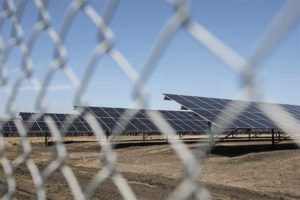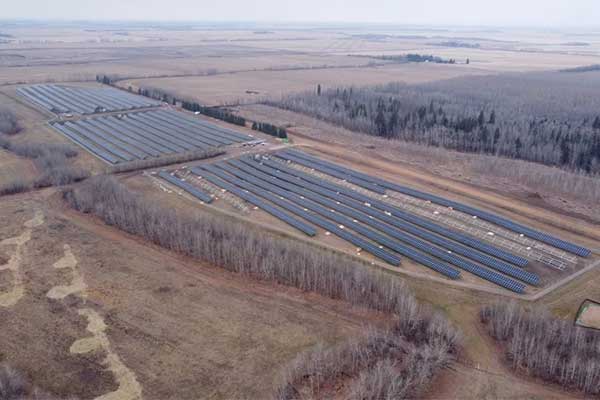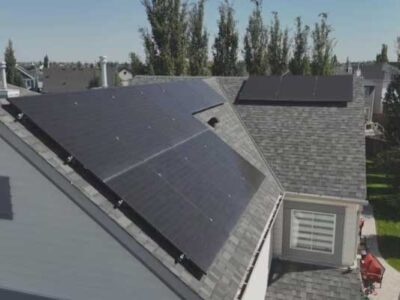Premier Danielle Smith is planning to introduce new restrictions on solar and wind development in another attempt to stifle Alberta’s burgeoning clean economy.
The regulations, which are set to be finalized before the end of the year, are supposedly “designed with environmental protection in mind” and build on the United Conservative Party’s (UCP’s) previous anti-renewable efforts. In 2023, they enacted a 7-month moratorium on new renewable energy projects, established 35-kilometre buffer zones around protected areas and ‘viewscapes,’ and implemented a near total ban on projects in prime agricultural areas — despite the many symbiotic benefits of agrivoltaics.

Marlaina Danielle Smith ECA is a Canadian politician and journalist who has been serving as the 19th premier of Alberta since October 11, 2022, and leader of the United Conservative Party since October 6, 2022. Smith entered provincial politics in 2009, becoming the leader of the Wildrose Party.
Now, Smith is planning to prohibit development on most native grassland as well as land that is irrigated (and potentially) irrigable. Combined with the previous restrictions, this could eliminate as much as 40% of Alberta’s land for potential renewable energy installations.
According to the Alberta Wilderness Association, the new protections for native flora could theoretically be positive, but only if they’re applied across the whole energy sector — not just solar and wind projects. Targeting renewables with burdensome regulations while exempting extractionary industries like oil and gas makes clear Smith’s real and startling anti-business intentions, and undermines the UCP’s claim that the changes are to ensure responsible land use and protect the environment.
Consequently, it’s become apparent that Smith — who leads a party ostensibly committed to the free market — is willing to use whatever power necessary to further the interests of fossil fuel companies and delay the diversification of Alberta’s economy, consequences be damned.

Some forecasts suggest Alberta will exceed its goal of 30 per cent renewable electricity by 2030, much of which is wind or solar. New projects like the solar farm in Edmonton’s river valley are contributing to the surge. (Photo: Amber Bracken / The Narwhal)
This is despite the fact that over the next few years, Alberta has the chance to solidify itself as a global cleantech leader, opening up billions of dollars in potential private investment. After all, Alberta has all of the necessary advantages to succeed, including an open electricity market, a world-class workforce, quality infrastructure, and an abundance of sunshine and wind.
Plus, the province’s renewable energy market is already one of Canada’s most mature, with Alberta representing over 60% of the country’s solar and wind development in 2021, 77% in 2022, and 92% in 2023. Stalling this momentum through heavy-handed legislation will do little but harm Alberta’s competitiveness and deter much-needed investment in the years ahead. In other words, it’s completely illogical.
Smith and the UCP may not want to admit it, but their economic plans are destined to fail Albertans as the world rapidly switches to clean, renewable energy. And with the demand for coal, oil, and natural gas on track to peak by 2030, the province is rapidly running out of time to change course.
As it stands, Smith is putting politics ahead of Alberta’s long-term prosperity — and delivering a master class in poor public policy while doing so.












Comments